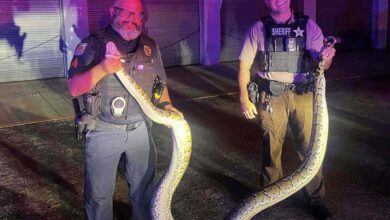When Is Fat Bear Week? Everything to About 2025’s Beefy Bear Contest
:max_bytes(150000):strip_icc():format(jpeg)/Fat-bear-week-2025-091925-027a261726304d5a8873f0cb5d15b9cd.jpg)
NEED TO KNOW
- Fat Bear Week is back, accepting votes Sept. 23 through Sept. 30
- Last year’s animal tournament received over 1.2 million votes from more than 100 countries
- Bears can eat over 40 salmon a day, packing on pounds to endure hibernation
It’s that time of year again in Alaska’s Katmai National Park and Preserve: Fat Bear Week is returning to celebrate the park’s brown bears as they bulk up for winter.
From Sept. 23 through Sept. 30, people all over the world will be able to cast votes online for their favorite beefy bears. The animal crowned at the end will be deemed the “fattest, most successful” bear when it comes to hibernation prep.
“Fat Bear Week is an election that celebrates the success, adaptability, and resiliency of Katmai’s bears,” said Charlie Annenberg, founder of Explore.org, which hosts the contest. “Chunk’s resilience, Grazer’s skill, and Bucky’s intelligence are only a few of the amazing stories we’ve followed at Brooks River this summer. The bears have grown as fat as I’ve ever seen them, thanks to another exceptional salmon run. Go big or go home!”
Here’s everything viewers need to know about Fat Bear Week 2025.
Candice Rusch
Why is Fat Bear Week important?
Fat Bear Week may be a lighthearted competition, but it underscores survival. For Katmai’s approximately 2,200 brown bears, fat is everything. A bear can lose one-third of its body weight during hibernation, and females won’t even become pregnant unless they have enough reserves — roughly 25% body fat. “A fat bear is a successful bear. Fat bears mean they are healthy bears and ready for the winter,” the National Park Service (NPS) noted in a release obtained by PEOPLE.
The event also brings global attention to Katmai, which boasts one of the world’s healthiest sockeye salmon runs. Salmon are critical, and bears can consume more than 40 in a single day, translating to around 100,000 calories. Without this abundance, reproduction rates fall, cub survival drops, and entire ecosystems can shift.
Fat Bear Week also showcases what’s at stake in a warming climate. Salmon thrive in cold water, and rising temperatures threaten their runs. “Fat Bear Week raises awareness by bringing the relationship between the bears and the salmon to the forefront,” the NPS explained. “Preservation of a healthy ecosystem for Brooks River is essential for all the animals of Katmai.”
Candice Rusch
Where can people vote on the bears?
Voting happens daily at fatbearweek.org, starting Sept. 23, from 12 – 9 p.m. EST/ 9 a.m. – 6 p.m. PST. Animal lovers will vote on bracket-style matchups between Katmai’s biggest bears. Voters can keep an eye on the contestants through Explore.org’s bear cams. Matchups are single elimination, with the winner crowned on Sept. 30.
Participation has soared since the contest began as “Fat Bear Tuesday” in 2014, with just 1,700 votes. Last year, more than 1.2 million votes poured in from over 100 countries. To prevent skewed tallies, Explore.org says it filters out fraudulent entries and closely monitors for bots or duplicate voting.
How much sockeye salmon can a bear eat a day?
When salmon surge at Brooks River, bears gorge. Some eat over 40 salmon in a single day, with the record set by Otis (Bear 480): 42 salmon in 5½ hours — nearly 240,000 calories.
To survive, bears must consume an entire year’s worth of food in just six months. During peak feeding, they can gain more than two pounds of fat per day.
Never miss a story — sign up for PEOPLE’s free daily newsletter to stay up-to-date on the best of what PEOPLE has to offer, from celebrity news to compelling human interest stories.
By October, males can weigh well over 1,000 pounds, with the largest topping 1,400 pounds. Females average around 700 pounds but need the fat even since higher body fat increases cub survival, and lactating females can lose even more than a third of their weight over winter. Their diet isn’t all salmon — the bears also eat grasses, berries, and other vegetation — but the salmon is the best calorie source for the long winter ahead.
Candice Rusch
Who won in previous years?
The champions’ circle includes some fan favorites. Grazer (Bear 128) has won two years in a row, in 2023 and 2024, making her the first mother bear to win. She’s back this year with a yearling cub and is known for her assertive fishing style and willingness to challenge larger males. Chunk (Bear 32), who broke his jaw earlier this year but remains one of the largest bears on the river, is also a strong contender for the 2025 Fat Bear Week title.
Other winners include Otis (Bear 480), a four-time champion recognized for his patient “sit and wait” technique, and 747, one of the heaviest bears ever seen at Brooks River. Since bears aren’t collared or tagged, rangers identify them by physical traits like scars, ear shape, and behavior.
Credit to Nypost AND Peoples



